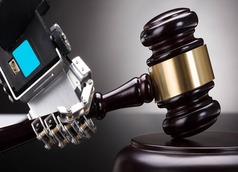The law has been constantly accused of playing catch-up with technology; in that, when a new technology is invented there is no law to regulate its use. Unfortunately, this trend is not likely to change anytime soon seeing that even lawmakers in all their might cannot ‘predict the future’, pun intended.
The best approach to mitigate this lack is for lawmakers to be constantly on the alert for emerging technologies, make it their responsibility to understand it as fast as possible and then come up with reasonable regulations to avoid its misuse. I say reasonable to also emphasize the importance of embracing innovation and not to hinder creativity!
The law generally provides for remedies for injuries against a person’s character, fame or reputation, a tort (civil wrong) commonly known as defamation. Under defamation, there is the tort of Libel which encompasses defamatory statements that are published and bring contempt, disrespect, hatred or injury to a person. Slander, on the other hand, is oral defamation, which is speaking false and malicious words about an individual and harming their reputation. In Kenya, the Defamation Act cap 63 provides for the above torts.
Deepfakes
Deepfake is a technology that uses artificial intelligence (intelligent machines that act and work like human beings) to produce a video or alter a video content to make it present something that did not happen or occur. In simpler terms, the technology enables anyone to create a video of anyone doing and saying things they never did or said. The technology works by transferring person X’s face to the body of person Y and hence making it look like person X is the one saying things or doing things that person Y did.
With the increase in the spread of fake news, deepfake is like the icing on the cake as it makes it almost impossible to know whether what one is seeing or hearing is indeed true. Imagine a scenario where a video of the president is circulated of him declaring a certain day a national holiday, the video is featured even in news cycles and people don’t turn up for work only to realize later that the video was a fake. This one is quite humorous, one can argue, no harm no foul, now imagine a video of the president declaring war or insight violence against a certain community and violence erupts as a result. By the time the video is recognized as a fake, the harm has already been done! Scary!
Currently, globally deepfake videos have been used to ridicule prominent persons, make them appear on porn videos. It has also been used to discredit or credit politicians for political mileage. Its potential, however, has not been fully explored seeing that it is still a new technology.
One could ask whether the technology is all together harmful and should be done away with. I would argue that it is not as it can be a source of comic relief. We have shows like the XYZ show which is aired on national television that mimics politicians for comic relief and yet it is legal and causes no harm. Deepfake technology could be used for the same as long as it does not infringe on anyone’s rights or spread malicious lies.
What can the Law do?
Seeing that there is no law specifically addressing deefakes, the law could start by clearing what deepfake technology is. This would make it easier for everyone to understand it and maybe even spot it.
Secondly, the law should specify circumstances/events in which deepfake videos should not be made/used. For example, California state is among the first states to legislate on deepfakes. Assembly Bill 602 and 730 provide for instances when using a deepfake will be punishable. The former illegalizes deefake videos for pornography while the latter for political mileage 60 days before elections .
Seeing that depefake affects some offenses already covered by existing laws, deepfake law should be merged with such to provide for;
- The right to sue in the case of any form of defamation.
- The right to sue in case of copyright infringement
- The right to sue in case of violation of privacy
- The right to sue in case of causing mental harm and harassment
- The right to sue in case of violation of any human right
The public should be advised to educate themselves more on deepfakes and how to spot a fake video from an actual video. Also before you act on any information, verify.
